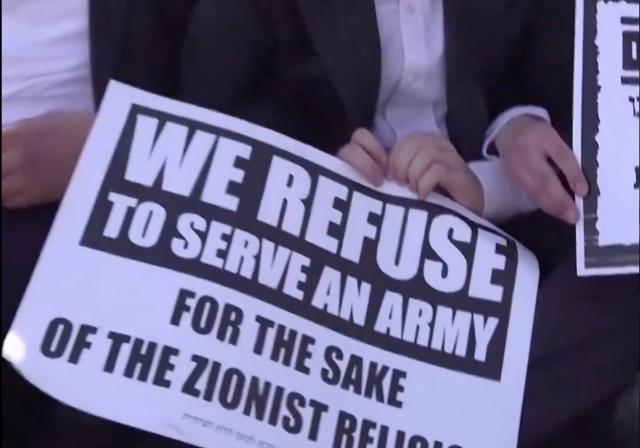In a landmark decision, Israel's Supreme Court has decreed that ultra-Orthodox Jewish seminary students must be drafted into the military, effectively ending a long-standing exemption and potentially destabilizing Prime Minister Benjamin Netanyahu’s coalition. The ruling has sparked intense debate and highlighted deep societal divides.
Breathing Room for Compromise
While the court has mandated the immediate initiation of the drafting process for approximately 3,000 ultra-Orthodox students, Attorney General Gali Baharav-Miara has indicated there is some leeway for Netanyahu to negotiate a compromise. This narrow window is crucial for maintaining the fragile balance within his coalition, which is heavily reliant on ultra-Orthodox support.
🔴 Israel’s High Court rules unanimously: 𝗴𝗼𝘃𝗲𝗿𝗻𝗺𝗲𝗻𝘁 𝗺𝘂𝘀𝘁 𝗱𝗿𝗮𝗳𝘁 𝘂𝗹𝘁𝗿𝗮-𝗢𝗿𝘁𝗵𝗼𝗱𝗼𝘅
— Jewish News Syndicate (@JNS_org) June 25, 2024
▸ The scheme allowing yeshiva students to defer until reaching the age of exemption from military service is“unconstitutional.”
𝗥𝗘𝗣𝗢𝗥𝗧▸https://t.co/2KeqTPJH5w pic.twitter.com/F7twQl6HMc
Public Reaction: A Nation Divided
The ruling has been met with mixed reactions across Israel. The majority of Israelis celebrated the decision, viewing it as a step towards equality. For decades, many have felt that the Haredi population, while benefiting from state resources, has not adequately contributed to national defense or the broader society. This sentiment of inequality has fueled widespread support for the court's decision.
Conversely, ultra-Orthodox communities and their leaders have vehemently opposed the ruling. Haredi newspapers headlined their discontent, portraying the decision as an existential threat.
The best news coming out of #Israel in years:
— Daniel Pipes دانيال بايبس 🇺🇦 (@DanielPipes) June 25, 2024
Yeshiva students must serve in the military, the Supreme Court ruled in unanimous 9-0 decision. "The state does not have the authority to order a blanket exemption from their enlistment."https://t.co/jec9IUgjqW
Voices of Dissent
Haredi Media Outcry
- Hamevaser: Affiliated with Minister Meir Porush, Hamevaser declared, "There is a serious danger to the future of the state if we lose our central anchor of survival against those who seek to harm us."
- Yated Ne’eman: Linked with Degel HaTorah, Yated Ne’eman lamented, "The High Court judges called out 'in one voice' against many generations of pure Torah learning. They have destroyed the Beit Midrash."
- Hamodia: Associated with Minister Yitzhak Goldknopf, Hamodia accused the High Court of breaking the status quo and declaring war on the Torah world.
- Hapeles: Representing the Jerusalem Faction, Hapeles claimed, "The war to uproot Judaism through a ruling of persecution has reached a new high."
Israel’s Supreme Court on Tuesday ruled that the military must begin drafting ultra-Orthodox Jews, a decision that threatened to split Prime Minister Benjamin Netanyahu’s wartime government. https://t.co/MgIAio83oa pic.twitter.com/Y14cQ04cBi
— The New York Times (@nytimes) June 26, 2024
Political Reactions
- Minister of Construction and Housing Yitzhak Goldknopf: Described the ruling as an "expected and very regrettable and disappointing decision," emphasizing that "The Holy Torah will overcome."
- MK Israel Eichler: Criticized the court as a "dictatorial body" and warned of a potential religious war and societal rift. He stated, "The High Court ruling is not nine judges against zero. It is nine judges against 3,500 years of Torah study."
- Shas Chairman Aryeh Deri: Asserted that Torah study is the Jewish people's secret weapon and essential for survival. He proclaimed, "No arbitrary ruling will cancel out Torah Learners in the Land of Israel."
- Minister of Jerusalem and Israel's Tradition Meir Porush: Warned that the ruling could lead to a divided state, one secular and one religious. He insisted, "There is no power in the world that can force a person whose soul longs to study Torah, to refrain from it."
Israel's Shas party chairman Aryeh Deri staunchly opposes the IDF's draft of Haredi Torah students, declaring in an interview with Haderech newspaper that no Torah student will be enlisted. He firmly asserts, "No one will be drafted into the army."#IDF #Palestine #Israel #Gaza… pic.twitter.com/moWnHhyILS
— Yeni Şafak English (@yenisafakEN) June 26, 2024
The Road Ahead
This ruling has set the stage for a significant cultural and political battle in Israel. The ultra-Orthodox community's resistance to the draft reflects deep-seated beliefs about the primacy of Torah study and religious autonomy. Meanwhile, the broader Israeli public's support for the decision underscores a desire for greater social equity and shared national responsibilities.
As Israel navigates this contentious issue, the country's unity and the future of Netanyahu’s coalition hang in the balance. The coming months will be crucial in determining whether a compromise can be reached that respects both the country's security needs and its diverse religious convictions.


